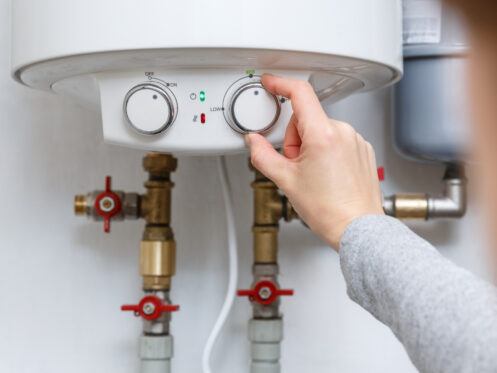When you need to keep your home warm and heat your water, you can do so with a boiler. These systems are capable of heating water before distributing the water or steam to various rooms throughout your home. If you’re in the market for a boiler, there are many types of boilers and features to consider during your search. By weighing your options early on, you should be able to make a quicker and more decisive purchasing decision.
Types of Boilers to Consider
There are several types of boilers at your disposal, which are based on the fuel source that’s used during the heating process.
Electric Boiler
An electric boiler offers high energy efficiency. Even though electricity costs are high, you won’t use much of this energy source to power your boiler. The main benefit of using an electric boiler is that it doesn’t burn fossil fuels, which is good for the environment.
Gas Boiler
A gas-fired boiler is a type of heating system that can be fueled by propane or gas. Both fuel sources are efficient. One issue with using a gas-fired boiler is that natural gas isn’t as prevalent as electricity or propane. Depending on where you live, you may need to pay higher prices if gas is scarcer in your area. While propane is oftentimes more expensive in comparison to natural gas, it’s also easier to source.
Oil Boiler
The third option at your disposal is an oil-fired boiler. To use this type of boiler, you must have oil delivered to your home, after which it needs to be stored in tanks until you make use of it. Your ongoing costs to power an oil boiler depend on the changes in national oil prices.
Keep in mind that it’s possible to purchase an oil boiler that accommodates biodiesel fuel. This type of fuel doesn’t create as much pollution as standard heating oil. It can also be relatively close to the cost of regular oil.
Understanding Key Features
Boilers can either be non-sealed or sealed combustion systems. If you purchase a non-sealed combustion boiler, this type of unit will bring in heated air before sending it up your home’s chimney, which wastes some of the energy that you use when heating the air. A sealed combustion system will bring in outside air before exhausting the gases outside, which is a more efficient combustion method.
The different boilers on your shortlist can be classified as either non-condensing or condensing. A condensing boiler is designed to concentrate the water vapor made during the heating process. Waste heat is then used to heat cold water that’s sent into the boiler. These systems are highly efficient because they’re able to deliver heat while maintaining a relatively low system temperature.
A non-condensing boiler is somewhat less efficient because it runs at higher temperatures. You’ll also notice that some of the heat produced from the system is vented outside your home. You can expect condensing boilers to have an efficiency that’s often above 90%. Non-condensing boilers are usually around 80%-88% efficient.
How Boilers Distribute Heat
There are three ways that boilers can distribute heat throughout a home, each of which has its own advantages.
How Water Radiator
The boiler you buy can come with a hot water radiator, which is common in newly built homes. These radiators are positioned near a room’s baseboard and are designed to reduce the amount of energy that’s consumed in your home.
When you install a hot water radiator, you can accurately control the temperature for every floor. In fact, different valves can be connected to different thermostats. One issue with a hot water radiator is that it introduces air into the system that can hurt efficiency.
Steam Radiator
Steam radiators can be placed along a wall in your home. These systems are regularly found in older homes. Even though they aren’t as common as they once were, they are known to deliver consistent and reliable heat. Keep in mind that maintenance requirements are relatively high. It’s also possible that the system itself will create an indentation in your floor, which may lead to the system tilting and causing loud noises.
Hydronic Floor Heating
A hydronic floor heating system uses water to heat your home. Once the boiler heats water, it will flow to the tubing that’s positioned under your flooring. This tubing acts as a radiator that can heat the entire house. It’s possible for hydronic floor heating to be zoned with separate thermostats for each room or area in your home.
If you opt for hydronic radiant heating, you’ll benefit from high efficiency in comparison to forced-air heating. Unlike forced-air systems, these units don’t send allergens into the air. Despite the many advantages of installing hydronic floor heating, the installation costs can be high.
Additional Considerations
Before you choose a boiler for your Lincoln, NE home, there are some additional considerations that might help you narrow your options.
Energy Efficiency
The efficiency of a boiler is rated with an annual fuel utilization efficiency (AFUE) score. This score tells you the amount of energy that’s being converted directly into usable heat. Currently, nearly all boilers come with AFUE ratings that exceed 80%. If you select a high-efficiency unit, you should receive an AFUE rating that ranges from 90%-98%. While highly efficient systems cost more than less efficient ones, they have lower operating costs.
A system with an AFUE rating of 90% can save you hundreds of dollars in annual energy costs when compared to a system that has a 70% rating. Based on FTC regulations, AFUE ratings must be placed on every new boiler. If you have an older boiler that didn’t come with a rating, there’s a good chance that it’s between 55%-70%. AFUE ratings are regularly updated based on national standards.
Your Home’s Climate
You should also base your purchasing decision on where you live. A high-efficiency boiler is particularly useful in colder climates that need consistent heating.
Boiler Size
Before you purchase a new boiler, consider the size of the unit. If you choose a boiler that’s too small for your home, it will work overtime to meet the heating demands that your home requires. On the other hand, a system that’s too large will cause you to spend more when heating your home.
Reputable heating and cooling professionals can help you understand which boiler size is right for your home. Some of the factors that they consider when making this determination include the thickness of your walls, air filtration, windows, insulation values, and foundation.
Type of Fuel
In most cases, gas-fueled boilers have lower operational costs than ones that are powered by oil. On the other hand, it’s possible for oil-fueled systems to have low operational costs when oil prices experience a sharp drop.
Once you select a new boiler for your home, consider having it installed by our team at John Henry's Plumbing, Heating, Air, and Electrical. We’re able to install every brand and type of boiler that you might buy for your property. We can also answer any questions you might have about how the system works before it’s installed. Here at John Henry's Plumbing, Heating, Air, and Electrical, our team provides cooling repair and installation services, plumbing services, and electrical services. Call John Henry's Plumbing, Heating, Air, and Electrical today to schedule service or inquire about the installation process.

